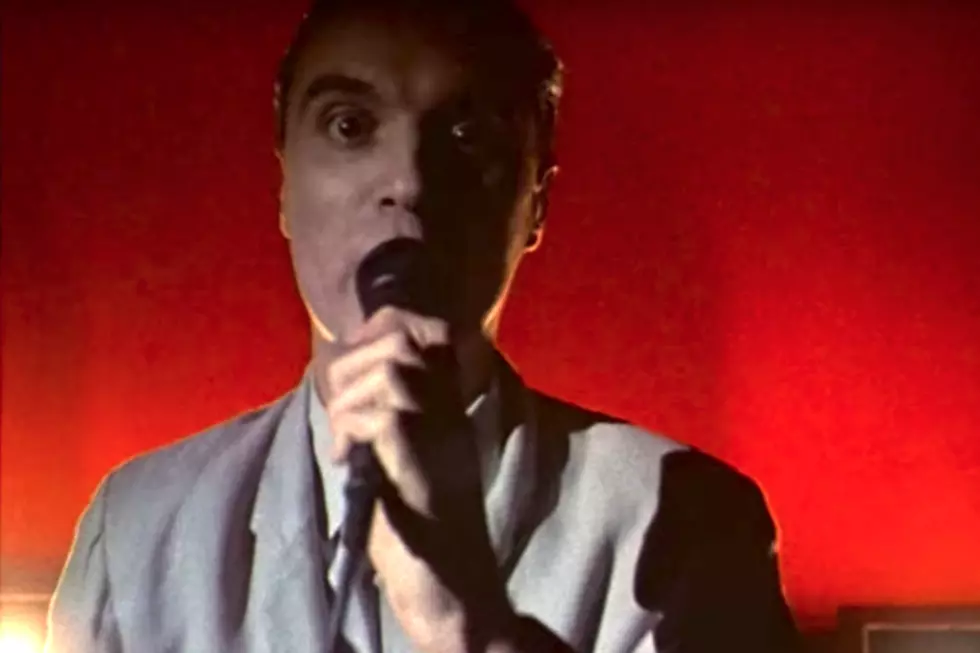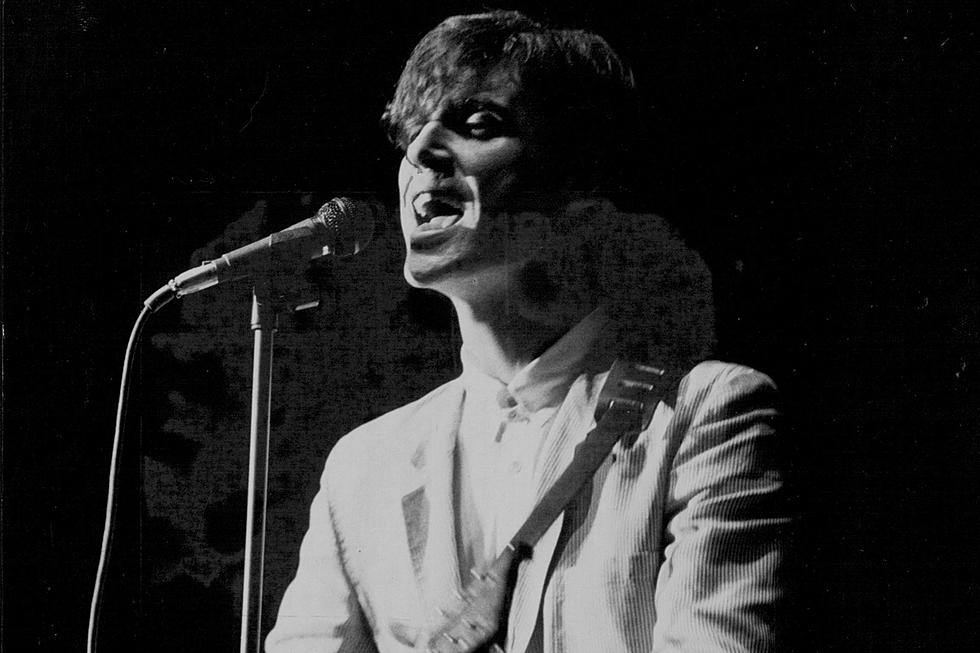
How Talking Heads’ ‘Stop Making Sense’ Changed Concert Films Forever
It was no accident that Jonathan Demme and Talking Heads found each other.
Demme, then an up-and-coming director, was actually a big fan. Meanwhile, the increasingly cinematic Talking Heads were on the brink of a big white suit-wearing breakthrough. It was a match made in movie heaven.
"In early 1983, [producer] Gary Goetzman and I went to see my favorite band, the Talking Heads, at the Hollywood Bowl in Los Angeles," Demme told Time in 2014. "The show was like seeing a movie just waiting to be filmed. We tracked [frontman] David Byrne down and pitched him on the idea of teaming up to make the picture."
Talking Heads brought along more than the suit. They had a determined vision for a concert film that would become Stop Making Sense.
"We didn't want any of the bullshit," Talking Heads drummer Chris Frantz told Rolling Stone in 1984. "We didn't want the clichés. We didn't want close-ups of people's fingers while they're doing a guitar solo. We wanted the camera to linger, so you could get to know the musicians a little bit."
Stop Making Sense emerged as more than a live document. Released on Oct. 18, 1984, the film brought fans into the creative process onstage, fashioning a stunning level of character-centered intimacy. The rest, the late Demme readily admitted, was already part of Talking Heads' concerts.
"David really saw this movie in his own head long before we came and pitched him on letting us shoot it," Demme told Time. "The big suit, the lighting, the staging, the choreography, the song lineup — everything was there in the show before the filmmakers showed up."
Talking Heads arrived at the peak of their powers, creating a fresh alchemy out of post-punk, New Wave, funk, pop and tinges of gospel during a multi-night stand at the Pantages Theater in Los Angeles. Byrne led an expanded line up of the group, creating a twitchy, Kabuki-inspired persona that added another layer of offbeat showmanship.
With so much to work with, Demme had the freedom to focus squarely on Talking Heads. Everything was in service of that goal, from the wide shots and lingering close-ups to the dramatic lighting and an inspired decision to ditch one of the most reliable conventions in concert films: the fan-reaction shot.
"I didn't want to go the route of constant cutaways to the audience, but rather I wanted to try to create a roving 'best-seat-in-the-house' – as if you were watching from the audience but could have any vantage point you wanted, on the basis of what the most exciting thing happening at that moment was," Demme told the San Francisco Gate in 1984. "I told them I could put a terrific team of filmmakers together, and that appealed to their craftsmanship and artistry: They are a very, very serious bunch of musicians."
Watch the Trailer for 'Stop Making Sense'
The movie begins slowly, simply, before it starts to build momentum. At first, Byrne walks onstage alone. Frantz, multi-instrumentalist Jerry Harrison, bassist Tina Weymouth and a group of talented sidemen eventually join him, one by one. The effect was very much like a traditional dramatic screenplay.
"Stop Making Sense was character-driven,” Byrne told the Guardian in 2017. "Jonathan's skill was to see the show almost as a theatrical ensemble piece, in which the characters and their quirks would be introduced to the audience – and you'd get to know the band as people, each with their distinct personalities. They became your friends, in a sense. I was too focused on the music, the staging and the lighting to see how important his focus on character was – it made the movie something different and special."
Then there was that suit, which provided an entry point for a group that hadn't yet developed a mainstream persona. "I was in Japan in between tours and I was checking out traditional Japanese theater — Kabuki, Noh, Bunraku — and I was wondering what to wear on our upcoming tour," Byrne told Time. "A fashion designer friend [Jurgen Lehl] said in his typically droll manner, 'Well David, everything is bigger onstage.' He was referring to gestures and all that, but I applied the idea to a businessman's suit."
Demme ended up joining Talking Heads on the road, before filming took place at the tail end of their tour in support of 1983's Speaking in Tongues. They'd built a deep sense of community before the first lens drew into focus. The band played with a crisp, veteran precision as Demme's cameras – led by celebrated director of photography Jordan Cronenweth – captured every intuitive look, every improvisational twitch.
As a result, nothing about it was observational, in the manner of traditional concert movies. Stop Making Sense drilled in on both the artistry and the sheer effort that goes into stage performances, with one of the '80s most intriguing groups as the conduit.
"I often find myself feeling that filming music is somehow the purest form of filmmaking," Demme told Time. "This crazed collision of sound and images, the intense collaboration, these incredibly cinematic performances. And for the nights you're filming, a non-player like me gets to feel somehow part of the band."
Stop Making Sense made millions at the box office, even as it redrew the rules for concert films. That was quite a relief to Talking Heads, who'd mortgaged everything for this moon-shot collaboration.
"One thing that nobody ever mentions – particularly our singer, David Byrne – is the fact that the band paid for the movie," Frantz told Rolling Stone. "Yes, we got a loan from Warner Bros., but it was against our royalties – so the band, the four of us, really coughed up the money. We didn't have a whole lot of savings at the time, so we were basically putting our life savings into this movie, which we did. I’m glad we did, because not only did we get it back, but we have a great movie."
Demme would leverage this success into an acclaimed career, both with dramatic films like Silence of the Lambs and Philadelphia and other concert docs from the likes of Neil Young and Justin Timberlake. But Stop Making Sense remained a touchstone.
"I'm a rock fanatic, and I've seen hundreds of live shows all over the world – and precious few bands can really support 90 minutes of attention," Demme told the Los Angeles Times in 1985. "But the Heads are so ultra-interesting to watch, and David Byrne is a living phenomenon who has to be experienced. He's a full-blown original, and I just knew that was going to work for the movie. I knew that for people who had never seen Talking Heads, this film would be an instant revelation."
The Most Awesome Live Album From Every Rock Legend
More From 92.9 The Lake










